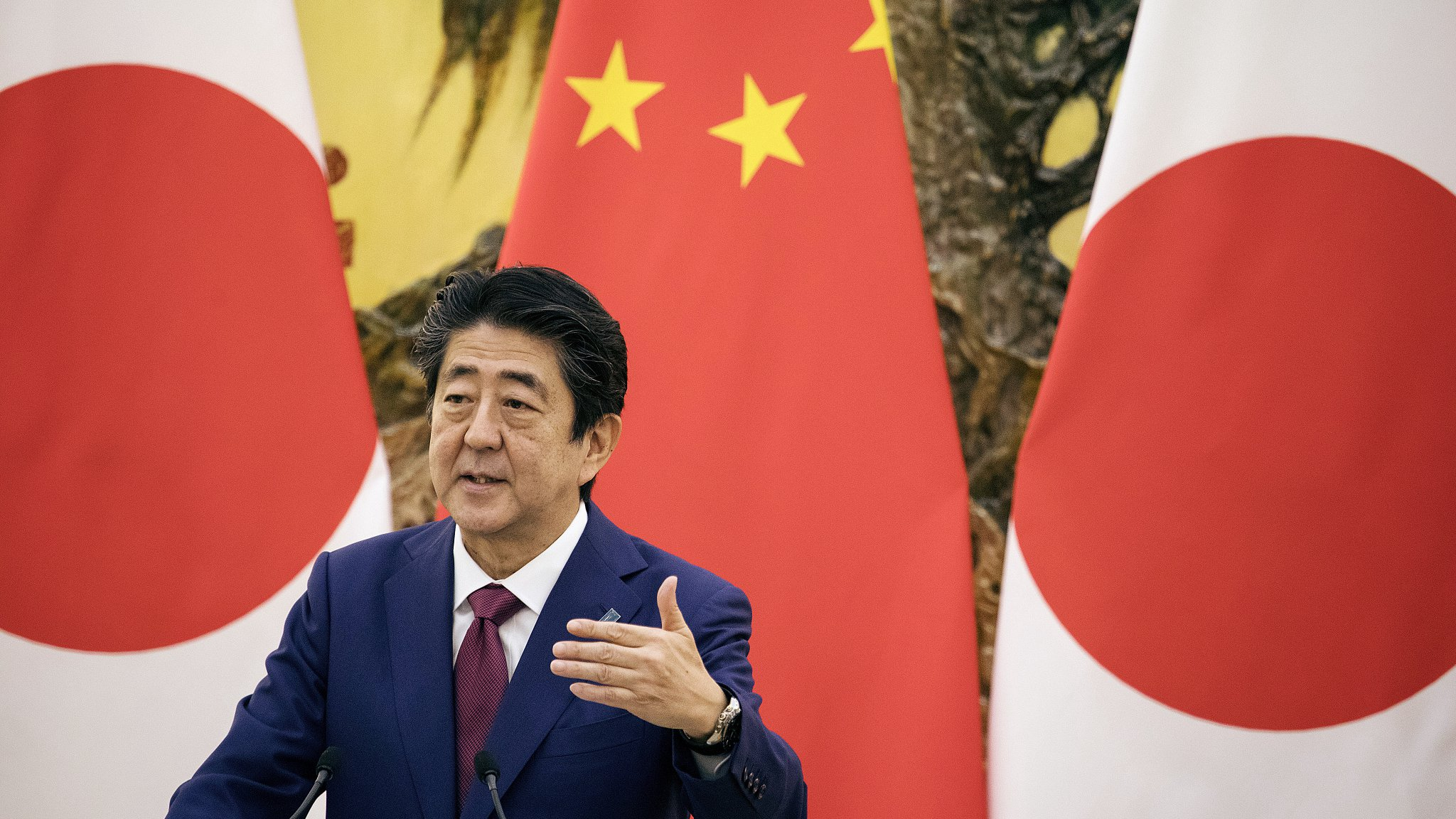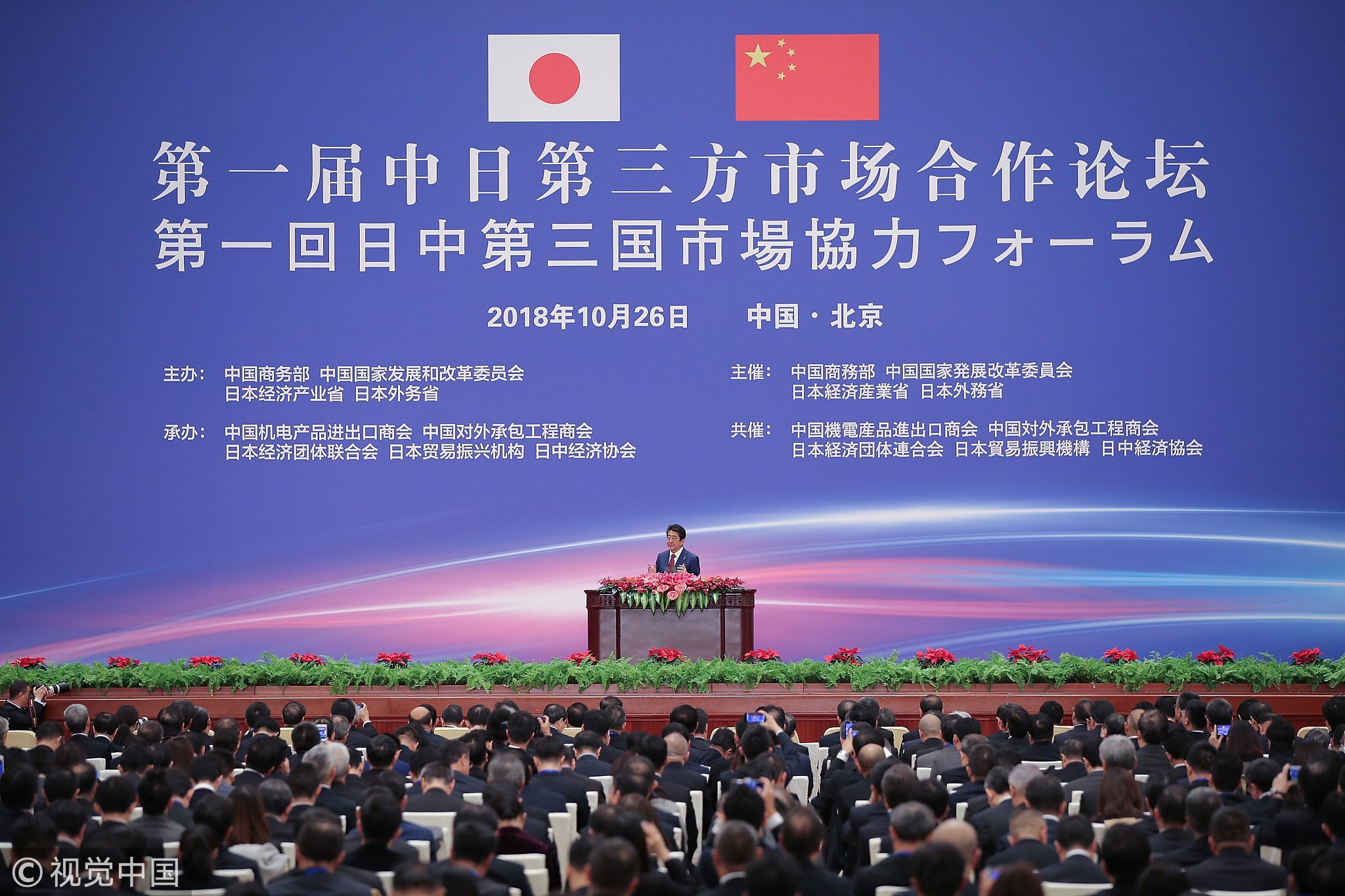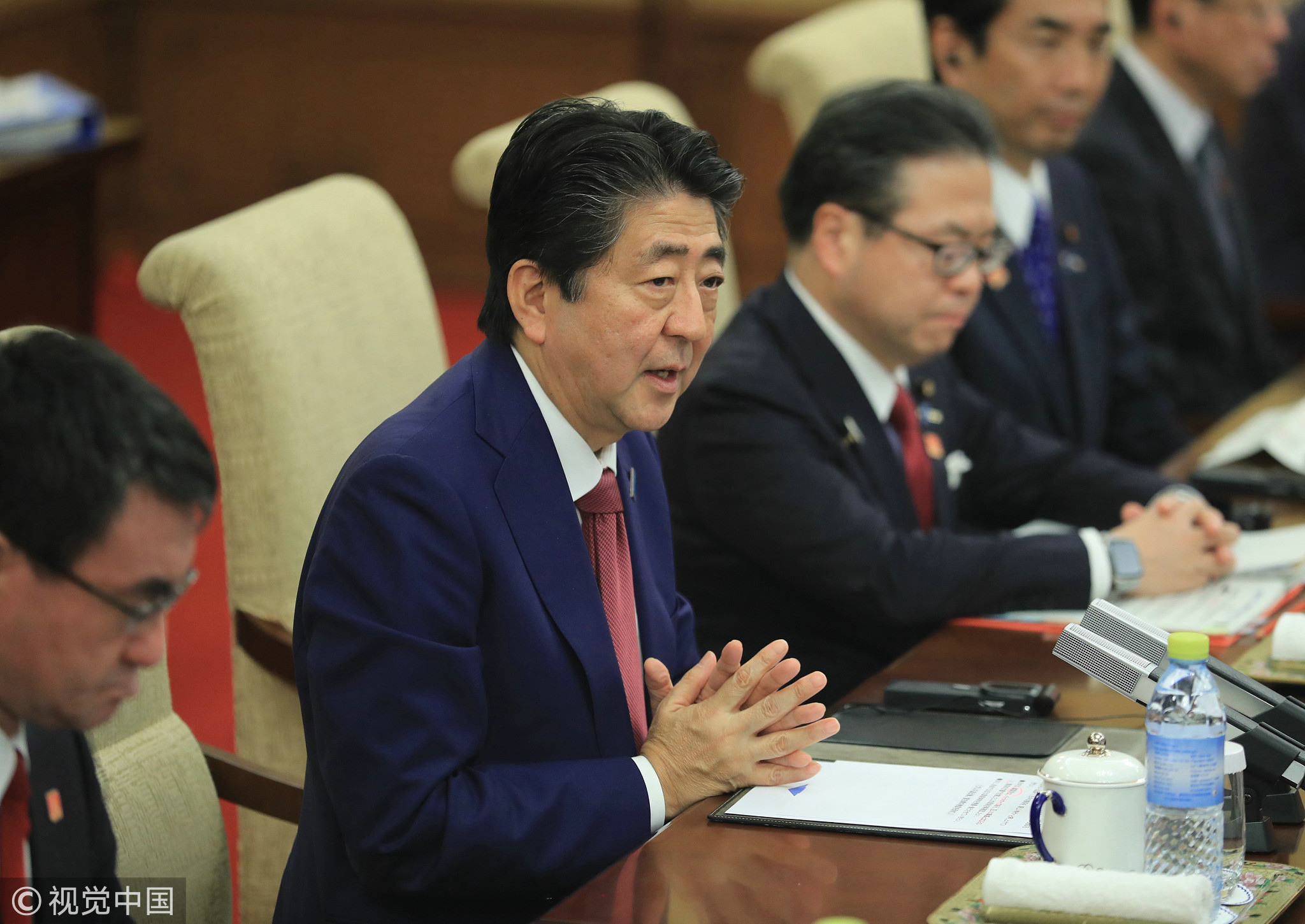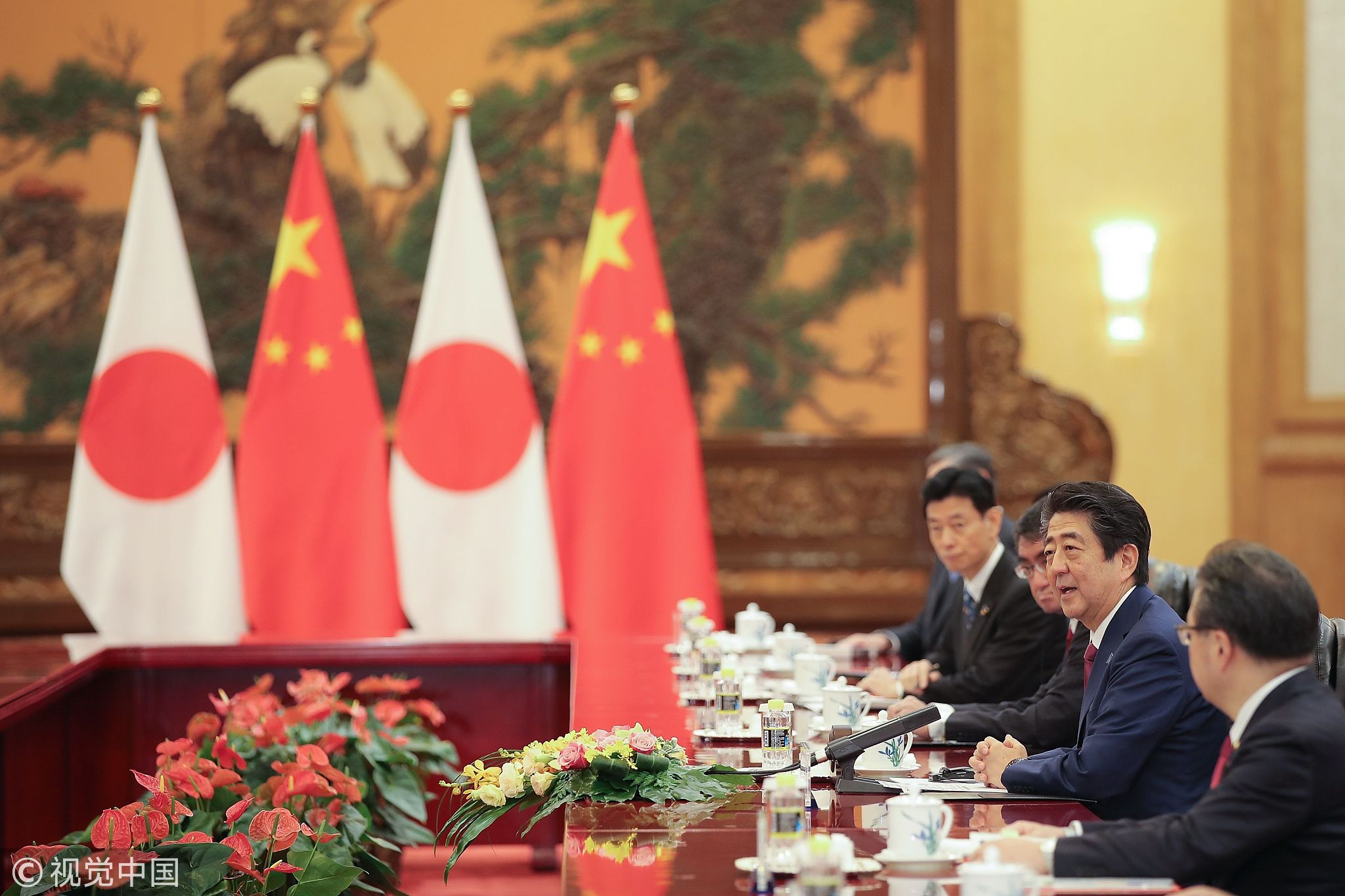
Opinions
09:39, 28-Oct-2018
Opinion: Abe’s trip helps push Sino-Japanese ties to new stage
Updated
09:13, 31-Oct-2018
Chen Yang & Guan Zhaoyu

Editor's note: Chen Yang is a PhD candidate of Tokyo-based Toyo University and Guan Zhaoyu is an associate research fellow at Chongyang Institute for Financial Studies under Renmin University of China. The article reflects the authors' opinion, and not necessarily the views of CGTN.
Japanese Prime Minister Shinzo Abe returned to Tokyo on October 27 after a three-day official visit to China. Abe's trip to Beijing is the first by a Japanese prime minister since 2011 when Yoshihiko Noda paid an official visit to the country.
The just-concluded visit signals that Sino-Japanese relations will enter a new stage, and that the two countries will deepen cooperation in many fields including economy and diplomacy in the future.
It's safe to say Prime Minister Abe returned home with fruitful results.
First, the cooperation between China and Japan in the fields of economy and trade will be deepened and strengthened. During his visit, the People's Bank of China and the Bank of Japan signed a bilateral local currency swap agreement of 200 billion yuan (3.4 trillion yen, 30 billion US dollars), which is valid for three years and can be extended by mutual agreement.

Japanese Prime Minister Shinzo Abe attends the 1st China-Japan Third Party Market Cooperation Forum with Chinese Premier Li Keqiang at the Great Hall of the People in Beijing, China, October 26, 2018. /VCG Photo
Japanese Prime Minister Shinzo Abe attends the 1st China-Japan Third Party Market Cooperation Forum with Chinese Premier Li Keqiang at the Great Hall of the People in Beijing, China, October 26, 2018. /VCG Photo
The two countries revived the arrangement, five years after the previous one expired in September 2013. This reflects the upgrade of China-Japan economic cooperation, which is an important step in the financial cooperation between the two sides.
At the same time, the People's Bank of China has decided to authorize the Bank of China Tokyo Branch to serve as the yuan clearing bank in Japan, which will further promote bilateral trade and investment facilitation.
In addition, during the first China-Japan Third-Party Market Cooperation Forum, the two governments signed 52 cooperation agreements spanning financial institutions, local governments and enterprises, with a cumulative value of over 18 billion US dollars.
In his meeting with Chinese President Xi Jinping on October 26, Prime Minister Abe stressed that "the Belt and Road (Initiative) is a promising concept and Japan is willing to strengthen cooperation with China in a wide range of areas, including jointly exploring third-party markets."
It's not only economic and trade exchanges between China and Japan that are set to further deepen, their cooperation in third-party markets will also be strengthened, thus contributing to the sound cooperation and interaction between the two countries.

Japanese Prime Minister Shinzo Abe speaks during a summit with Chinese President Xi Jinping (not pictured) at the Diaoyutai State Guesthouse in Beijing, China, October 26, 2018. /VCG Photo
Japanese Prime Minister Shinzo Abe speaks during a summit with Chinese President Xi Jinping (not pictured) at the Diaoyutai State Guesthouse in Beijing, China, October 26, 2018. /VCG Photo
Second, the "Three Principles of Sino-Japanese Relations" proposed by Abe were confirmed.
During his talks with Premier Li Keqiang, Abe put forward three principles for the future development of Sino-Japanese relations, namely the two countries' relationship is transforming from competition to coordination and cooperation; China and Japan are neighbors, partners and do not present a threat to each other; China and Japan are jointly promoting free and fair trade.
According to a report by Japan's national broadcaster NHK, the three principles were recognized and appreciated by China.
The "Three Principles of Sino-Japanese Relations" will lay a good foundation for the stable development of Sino-Japanese relations in the future.
Finally, the mechanism of mutual visits between the leaders of China and Japan has been restored. In May this year, Premier Li paid an official visit to Japan while attending the China-Japan-ROK summit meeting in Tokyo (the last official visit by a Chinese premier to Japan was in 2010).

Japanese Prime Minister Shinzo Abe (2nd-R) attends a meeting with Chinese Premier Li Keqiang (not pictured) inside the Great Hall of the People in Beijing, October 26, 2018. /VCG Photo
Japanese Prime Minister Shinzo Abe (2nd-R) attends a meeting with Chinese Premier Li Keqiang (not pictured) inside the Great Hall of the People in Beijing, October 26, 2018. /VCG Photo
Abe's visit to China is at the invitation of Premier Li.
Japan's hope is that President Xi can make an official visit to Japan. The last time a Chinese president paid an official visit to Japan was in 2008.
Abe's visit to China serves as a link between the past and future. It's more than a return visit to China, it paves the way for Xi's visit to Japan.
Prime Minister Abe has extended an invitation to President Xi to visit Japan during the summit and said he hopes to visit China again during the China-Japan-ROK leaders' meeting next year.
Abe's visit to China has not only injected fresh impetus into Sino-Japanese relations but also helped revive the mechanism of mutual visits between leaders of China and Japan. This is arguably the biggest achievement of Abe's trip.
In retrospect, the improvement of Sino-Japanese relations has not come easily and needs to be cherished. Abe's visit to China is sure to push Sino-Japanese relations into a new phase.
Only through solid cooperation, continuous consolidation of friendly foundations and increased mutual understanding and political mutual trust can we truly achieve the sound and sustainable development of Sino-Japanese relations, and ensure the steady and sustained growth of Sino-Japanese relations in the new stage.
(If you want to contribute and have specific expertise, contact us at opinions@cgtn.com.)

SITEMAP
Copyright © 2018 CGTN. Beijing ICP prepared NO.16065310-3
Copyright © 2018 CGTN. Beijing ICP prepared NO.16065310-3